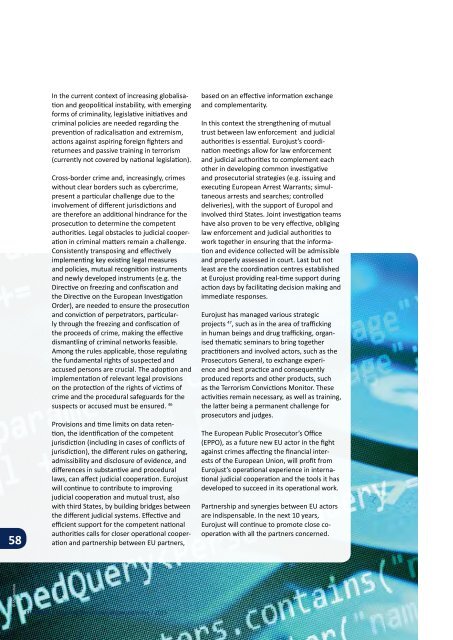eu-europol-org-crime-report
eu-europol-org-crime-report
eu-europol-org-crime-report
You also want an ePaper? Increase the reach of your titles
YUMPU automatically turns print PDFs into web optimized ePapers that Google loves.
58<br />
In the current context of increasing globalisation<br />
and geopolitical instability, with emerging<br />
forms of criminality, legislative initiatives and<br />
criminal policies are needed regarding the<br />
prevention of radicalisation and extremism,<br />
actions against aspiring foreign fighters and<br />
returnees and passive training in terrorism<br />
(currently not covered by national legislation).<br />
Cross-border <strong>crime</strong> and, increasingly, <strong>crime</strong>s<br />
without clear borders such as cyber<strong>crime</strong>,<br />
present a particular challenge due to the<br />
involvement of different jurisdictions and<br />
are therefore an additional hindrance for the<br />
prosecution to determine the competent<br />
authorities. Legal obstacles to judicial cooperation<br />
in criminal matters remain a challenge.<br />
Consistently transposing and effectively<br />
implementing key existing legal measures<br />
and policies, mutual recognition instruments<br />
and newly developed instruments (e.g. the<br />
Directive on freezing and confiscation and<br />
the Directive on the European Investigation<br />
Order), are needed to ensure the prosecution<br />
and conviction of perpetrators, particularly<br />
through the freezing and confiscation of<br />
the proceeds of <strong>crime</strong>, making the effective<br />
dismantling of criminal networks feasible.<br />
Among the rules applicable, those regulating<br />
the fundamental rights of suspected and<br />
accused persons are crucial. The adoption and<br />
implementation of relevant legal provisions<br />
on the protection of the rights of victims of<br />
<strong>crime</strong> and the procedural safeguards for the<br />
suspects or accused must be ensured. 46<br />
Provisions and time limits on data retention,<br />
the identification of the competent<br />
jurisdiction (including in cases of conflicts of<br />
jurisdiction), the different rules on gathering,<br />
admissibility and disclosure of evidence, and<br />
differences in substantive and procedural<br />
laws, can affect judicial cooperation. Eurojust<br />
will continue to contribute to improving<br />
judicial cooperation and mutual trust, also<br />
with third States, by building bridges between<br />
the different judicial systems. Effective and<br />
efficient support for the competent national<br />
authorities calls for closer operational cooperation<br />
and partnership between EU partners,<br />
based on an effective information exchange<br />
and complementarity.<br />
In this context the strengthening of mutual<br />
trust between law enforcement and judicial<br />
authorities is essential. Eurojust’s coordination<br />
meetings allow for law enforcement<br />
and judicial authorities to complement each<br />
other in developing common investigative<br />
and prosecutorial strategies (e.g. issuing and<br />
executing European Arrest Warrants; simultaneous<br />
arrests and searches; controlled<br />
deliveries), with the support of Europol and<br />
involved third States. Joint investigation teams<br />
have also proven to be very effective, obliging<br />
law enforcement and judicial authorities to<br />
work together in ensuring that the information<br />
and evidence collected will be admissible<br />
and properly assessed in court. Last but not<br />
least are the coordination centres established<br />
at Eurojust providing real-time support during<br />
action days by facilitating decision making and<br />
immediate responses.<br />
Eurojust has managed various strategic<br />
projects 47 , such as in the area of trafficking<br />
in human beings and drug trafficking, <strong>org</strong>anised<br />
thematic seminars to bring together<br />
practitioners and involved actors, such as the<br />
Prosecutors General, to exchange experience<br />
and best practice and consequently<br />
produced <strong>report</strong>s and other products, such<br />
as the Terrorism Convictions Monitor. These<br />
activities remain necessary, as well as training,<br />
the latter being a permanent challenge for<br />
prosecutors and judges.<br />
The European Public Prosecutor’s Office<br />
(EPPO), as a future new EU actor in the fight<br />
against <strong>crime</strong>s affecting the financial interests<br />
of the European Union, will profit from<br />
Eurojust’s operational experience in international<br />
judicial cooperation and the tools it has<br />
developed to succeed in its operational work.<br />
Partnership and synergies between EU actors<br />
are indispensable. In the next 10 years,<br />
Eurojust will continue to promote close cooperation<br />
with all the partners concerned.<br />
© Shutterstock<br />
EUROPOL / Exploring tomorrow’s <strong>org</strong>anised <strong>crime</strong> / 2015


